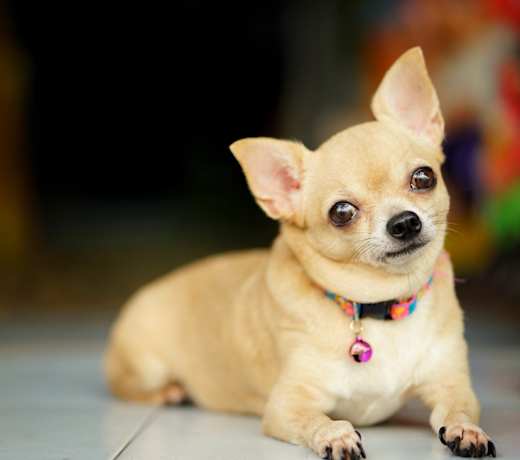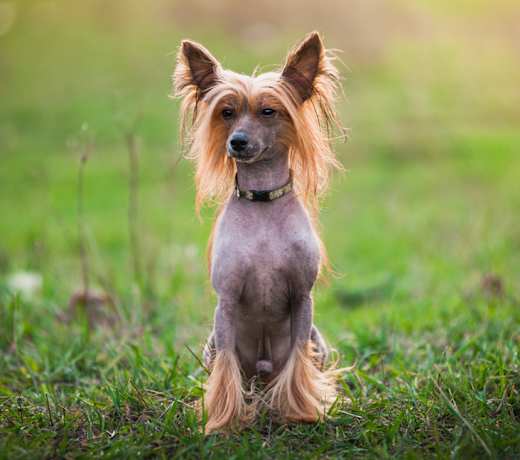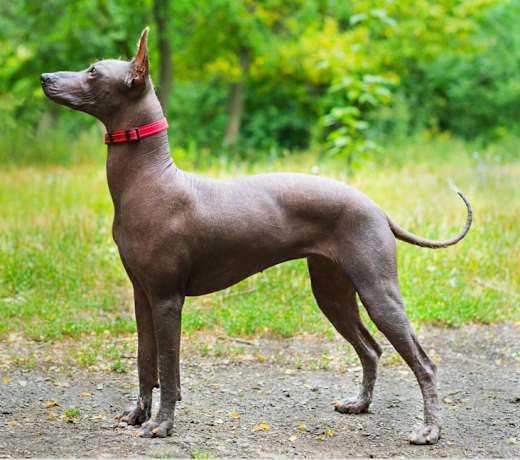American Hairless Terriers are small to medium-sized dogs, with most weighing 7 to 17 pounds and standing between 7 and 16 inches tall at the shoulder.
American Hairless Terrier
Breed Type: Terrier
Common nicknames: AHT
Coat: Hairless
Hypoallergenic: Yes, they may not trigger allergies.
Temperament: Affectionate, energetic, playful, friendly
Life expectancy: 14-16 years
Color & patterns:
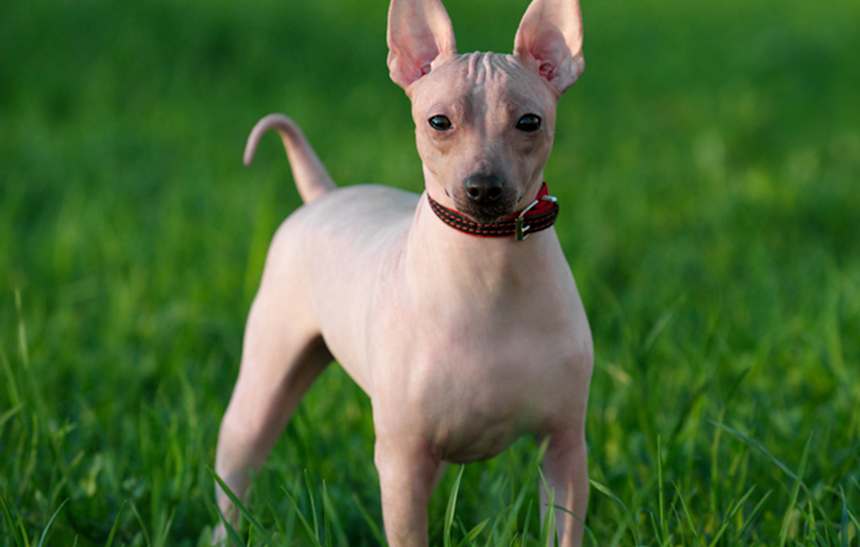
The American Hairless Terrier is a spirited and charismatic breed with an interesting history that began in the 1970s when a hairless puppy was born in a litter of Rat Terriers. These unique companions are truly one-of-a-kind with their small to medium size — they typically stand at around 10 to 16 inches tall — and smooth, hairless skin. American Hairless Terriers are known for their friendly and playful natures, making them wonderful playmates for humans and other pets — their lovable personalities and affectionate demeanor will warm your heart. Their intelligence and quick learning abilities make them excellent candidates for various activities and sports. Whether they are down for a game of fetch, a leisurely walk, or a cozy cuddle session, American Hairless Terriers bring a zest for life that is simply contagious.
American Hairless Terrier characteristics
Learn about about American Hairless Terrier basics like their fur colors, shedding levels, how much grooming they need, and other American Hairless Terrier facts.
Average height
7-16 inches (17.8-40.6cm)
Average weight
7-17 pounds (3.2-7.7 kg)
Average lifespan
14-16 years
Exercise needs
Grooming needs
Full-grown size
Good with cats
Good with kids
Training aptitude
Do American Hairless Terriers drool?
No, American Hairless Terriers do not typically drool. Drooling can vary among individual dogs of any breed, but as a general characteristic, American Hairless Terriers are considered low droolers.
Do American Hairless Terriers shed?
The hairless variety of the American Hairless Terrier does not shed since they lack a coat entirely. This makes them an excellent choice for people with allergies or those who prefer a non-shedding dog.
Coated American Hairless Terriers have a short, dense coat that sheds moderately. Regular brushing can help manage shedding and keep their coat healthy.
What color is an American Hairless Terrier?
The skin (and coat of the coated variety) of the American Hairless Terrier can be many colors, including apricot, black, chocolate, red, and more.
When is an American Hairless Terrier fully grown?
An American Hairless Terrier is fully grown by the age of 12 to 18 months. Most of their physical growth is completed by around one year of age, but they might continue to fill out and develop muscle tone until they are 18 months old.
Where did the American Hairless Terrier originate?
The American Hairless Terrier originated in Louisiana. In 1972, a hairless puppy appeared in a litter of Rat Terrier puppies. This hairless dog, named Josephine, went on to be the foundation of a new breed, the American Hairless Terrier.
How many types of American Hairless Terriers are there?
There are two types of American Hairless Terriers: the hairless variety and the coated variety. The hairless variety has no coat except for whiskers and eyebrows. The coated variety has a short, dense coat. Both types share the same general characteristics and traits typical of the breed.
How long do American Hairless Terriers live?
American Hairless Terriers live 14 to 16 years on average. This relatively long lifespan reflects the breed’s generally good health and robust nature.
Are American Hairless Terriers rare?
Yes, American Hairless Terriers are relatively rare. They are not as common as many other dog breeds, partly because they are a newer breed, having only been developed in the 1970s. The breeding population is smaller compared to more established breeds. Their unique hairless trait also makes them a niche breed, appealing to specific pet parents who appreciate or need hypoallergenic pets.
American Hairless Terrier temperament
Learn about about the American Hairless Terrier temperament and how well they fit into your lifestyle, home environment, and family.
Are American Hairless Terriers smart?
Yes, American Hairless Terriers are smart dogs. They are quick learners when it comes to obedience training and learning new commands. They can figure out solutions to challenges or puzzles presented to them, especially if there is a reward involved. They are also adaptable dogs who can adjust to different environments and lifestyles, which reflects their ability to understand and respond to new situations.
Do American Hairless Terriers bark a lot?
Yes, the American Hairless Terrier can bark a lot. Like many terriers, they are alert and usually quite fond of their own voices. As with any dog, American Hairless Terriers can be discouraged from barking as frequently with proper training, exercise, and mental stimulation.
Are American Hairless Terriers good with cats?
Yes, American Hairless Terriers can be good with cats, but it largely depends on the individual temperaments of the dog and cat. Introducing an American Hairless Terrier to cats from a young age can help them coexist peacefully. However, some American Hairless Terriers have a high prey drive, which can make them more inclined to chase small animals like cats. It’s important to monitor interactions and provide a safe space for the cat to retreat if needed.
Are American Hairless Terriers good with other dogs?
Yes, American Hairless Terriers can be good with other dogs, but their compatibility with other dogs largely depends on the individual temperament and socialization of all the dogs. Early and continued socialization is important to help American Hairless Terriers learn appropriate behavior around other dogs and to build confidence in social situations.
Some American Hairless Terriers might be dominant or assertive with other dogs, while others might prefer the company of certain dogs over others. When introducing an American Hairless Terrier to a new dog, it’s important to do so gradually and in a controlled environment. Monitoring interactions and reinforcing calm behavior can help facilitate positive relationships.
Can American Hairless Terriers swim?
Yes, American Hairless Terriers can swim, but like all dogs, their skill and comfort in the water can vary. Some American Hairless Terriers might naturally take to the water and enjoy swimming, while others might need more encouragement and training. Always supervise American Hairless Terriers when they are around water, especially if they are not experienced swimmers, to ensure their safety and allow you to assist them if needed.
Are American Hairless Terriers cuddly?
Yes, American Hairless Terriers are cuddly and affectionate with their pet parents. Their friendly and sociable nature can make them predisposed to enjoying physical closeness and interaction with their human family members. Additionally, the lack of fur in hairless varieties can drive them to seek warmth from their humans’ body heat, especially in cooler temperatures.
Are American Hairless Terriers easy to train?
Yes, American Hairless Terriers are typically easy to train as they are intelligent and eager to please. Many American Hairless Terriers are also very food-motivated, making treats an effective reward during training sessions.
Don’t be fooled by the “easy to train” label, though. Training dogs takes time (think months and years, not days) — it isn’t instant, regardless of breed.
Are American Hairless Terriers good with kids?
Yes, American Hairless Terriers are good with kids when properly socialized and trained. Affectionate, energetic, and playful, they make fun companions for kids. These active dogs enjoy playtime and exercise, which can make them good companions for active children who enjoy outdoor activities.
As with any breed, it is recommended that parents always supervise their children when interacting with dogs to keep both the child and dog safe.
Are American Hairless Terriers good family dogs?
Yes, American Hairless Terriers are good family dogs. Lively, energetic, friendly with strangers, and playful with kids, this breed makes for a great all-around companion. They adore human companionship and love sharing in all activities with their family.
However, as with any breed, it is recommended that your child is always supervised when interacting with your dog to keep both the child and dog safe. Teaching children how to properly approach and handle dogs is crucial to ensure positive experiences for both the dog and the child, as is teaching dogs how to interact gently with children.
American Hairless Terrier health
Learn about about the American Hairless Terrier health outlook and what diseases they may be prone to at various stages of their life.
Do you need to groom an American Hairless Terrier?
Yes, you need to groom an American Hairless Terrier, but their grooming needs are relatively low compared to some other breeds. The specific grooming requirements differ slightly between the hairless and coated varieties.
The hairless variety needs regular skin care to prevent dryness and irritation, including bathing every few weeks with a gentle dog shampoo to keep their skin clean and free from oils and dirt. Their skin also needs dog-safe moisturizers applied to prevent dry skin. Always use dog-safe sunscreen to protect their skin from sunburn if they will be outside for extended periods. Sweaters and other dog clothes help keep them warm during cold weather.
For the coated variety, brush once a week to remove loose hairs and keep their short coat healthy. Occasional baths keep the coat clean, depending on their activity level and how dirty they get.
What health problems do American Hairless Terriers have?
American Hairless Terriers are a healthy breed with a long average lifespan. Because the hairless gene in this breed is recessive, they do not suffer from the same genetic issues as the other hairless breeds. However, like all breeds, they are prone to certain health issues, including:
Hip dysplasia: Although less common than in larger breeds, hip dysplasia can occur in American Hairless Terriers. Responsible breeding practices can help reduce the incidence of this genetic condition.
Skin issues: Because of their hairless nature, they are more susceptible to skin issues such as sunburn, dryness, and irritation. Regular skincare, including moisturizing and sun protection, is important.
Legg-Calve-Perthes disease: This is a condition that affects the hip joint, leading to the degeneration of the femoral head (the ball of the hip joint). Surgery is the most effective treatment for the disorder.
Luxating patella: This is a condition where the kneecap slips out of place, causing discomfort or lameness.
Dental problems: Small breeds in general can be prone to dental issues such as dental decay and periodontal disease. Regular dental care, including brushing their teeth, can help prevent these problems.
Allergies: Some American Hairless Terriers develop allergies, which can manifest as skin irritation or gastrointestinal issues.
Eye problems: Some American Hairless Terriers develop eye conditions such as cataracts or progressive retinal atrophy (PRA). Regular eye exams can help detect and manage these issues early.
Is the American Hairless Terrier odorless?
No, the American Hairless Terrier is not completely odorless, but this breed is often described as having minimal body odor compared to other dog breeds. Because they are hairless or have a very short coat (in the coated variety), they do not trap as much dirt and oils that can contribute to strong odors. Regular bathing, typically every few weeks, also keeps their skin clean and free from odors. Many American Hairless Terriers even groom themselves like cats, which can help keep their skin and coat clean.
Are American Hairless Terriers hypoallergenic?
Yes, the hairless variety of American Hairless Terrier is hypoallergenic because they have no coat to shed and release dander into the environment. However, coated American Hairless Terriers are not hypoallergenic.
It’s important to note that no dog breed is guaranteed not to cause allergies. American Hairless Terriers are less likely to trigger allergies in people sensitive to dog dander, but individual reactions can still vary. Individuals with allergies considering an American Hairless Terrier should spend time with adults of the breed before bringing one home.
Find American Hairless Terrier puppies near you
Adopting an American Hairless Terrier
We don't see any American Hairless Terriers available for adoption in your exact location or cities near you, but here are some adorable similar breeds in Beverly Hills, CA.

Clayton
Chihuahua
Male, 2 mos
West Hollywood, CA

Mary Kate
Chihuahua Mixed Breed (Small)
Female, puppy
West Hollywood, CA

Drew
Chihuahua
Male, 2 mos
West Hollywood, CA

Molly
Chihuahua
Female, 15 yrs 1 mo
Los Angeles, CA
Good with dogs
Good with cats
Spayed or Neutered
Shots are up-to-date

Connor
Chihuahua
Male, 2 mos
West Hollywood, CA

Kiwi
Chihuahua
Female, 2 yrs
West Hollywood, CA
Shots are up-to-date

Stu
Chihuahua
Male, 2 mos
West Hollywood, CA
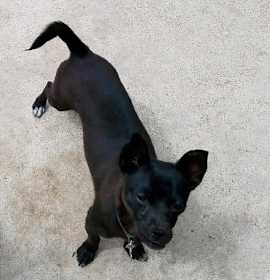
Pepper
Chihuahua
Male, 7 yrs 6 mos
Los Angeles, CA
Good with dogs
Good with cats
House-trained
Spayed or Neutered
Shots are up-to-date

Clayton
Chihuahua
Male, 2 mos
West Hollywood, CA

Mary Kate
Chihuahua Mixed Breed (Small)
Female, puppy
West Hollywood, CA

Drew
Chihuahua
Male, 2 mos
West Hollywood, CA

Molly
Chihuahua
Female, 15 yrs 1 mo
Los Angeles, CA
Good with dogs
Good with cats
Spayed or Neutered
Shots are up-to-date

Connor
Chihuahua
Male, 2 mos
West Hollywood, CA

Kiwi
Chihuahua
Female, 2 yrs
West Hollywood, CA
Shots are up-to-date

